For Young Women, Savitribai Phule’s Legacy Of Rebellion Is Empowering
The bright red slash of kumkum across her forehead has become a mark of feminist solidarity
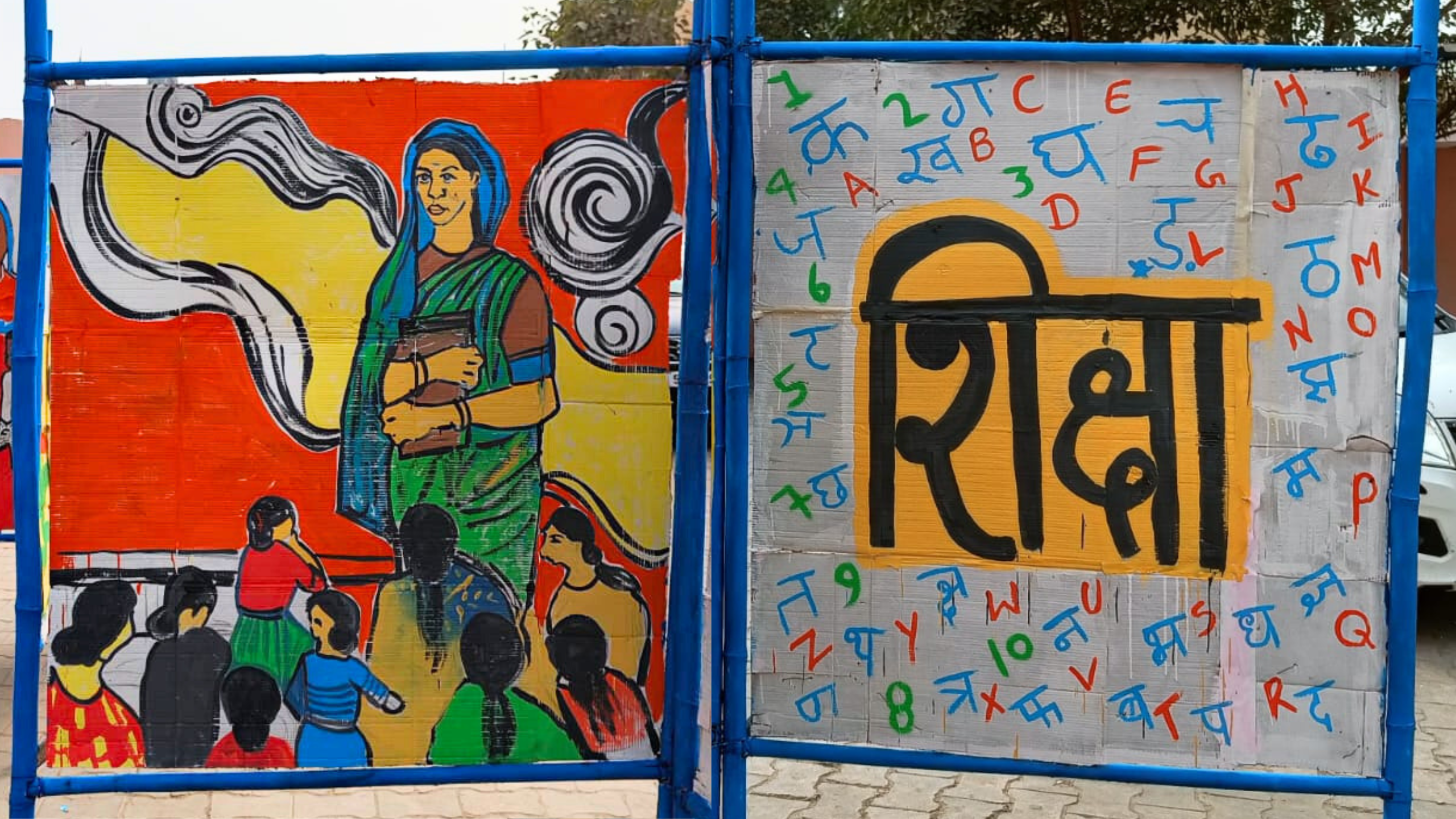
In the last two decades, a vibrant feminist tradition has evolved in Maharashtra – of celebrating the life and legacy of social reformer and educationist Savitribai Phule on January 3, her birth anniversary. Across the state, at public gatherings in bastis, community centres and cultural venues, Savitri Jayanti is being marked by revolutionary music, street plays, and discussions.
Huge crowds of admirers have been thronging to Naigaon in Satara, her birthplace, and Phule Wada in Pune, her home, this week. Women, especially young girls, dress up like Savitribai – iconic imagery shows her in a nauwari, a saree draped like a trouser, and the vivid red chiri, a horizontal dash of kumkum on her forehead. Women draw rangoli outside their homes, make sweets and decorate their homes with books, lamps and flowers and display leaflets and posters on their walls.
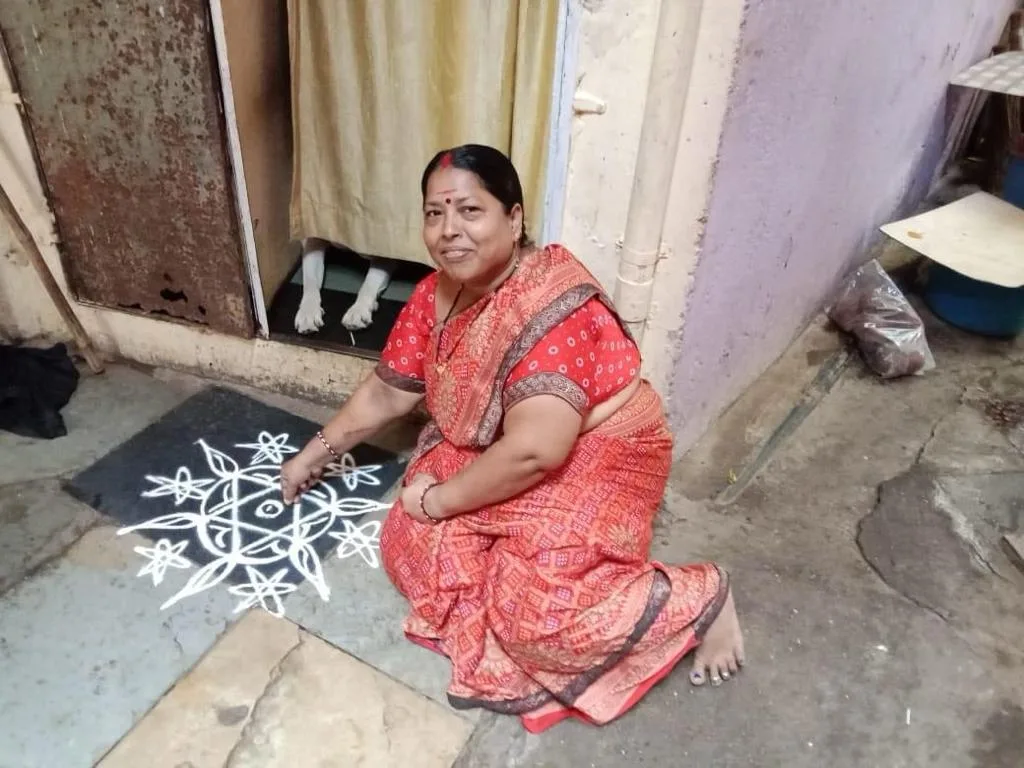
People also light lamps to signify the slogan, Ek diva dnyacha (light of knowledge). A famous folk song by activist Vasudha Sardar, Savitrichi ovee – an ode of gratitude to the reformer – is sung at homes, at workplaces and at events.
For Urmila Pawar, veteran writer and Dalit feminist, Savitribai is a symbol of solidarity and struggle against oppression. And her birth anniversary being celebrated this week is a reminder of how relevant she remains for the gender movement, 193 years since her birth.
“Savitribai’s Jayanti reminds us of the history of movements we marginalised women have created, be it the Dalit Panther movement or the feminist movement. None of this would have been possible without the pioneering work of Savitribai,” said Pawar. She was speaking at ‘Aazadi ke Bol – Soch Aur Sangharsh Ki Raah Par’, an event organised by Bebaak Collective to mark the anniversary at the Retreat House in Bandra in western Mumbai. The event was marked by panel discussions, cultural performances, film screening and revolutionary music.
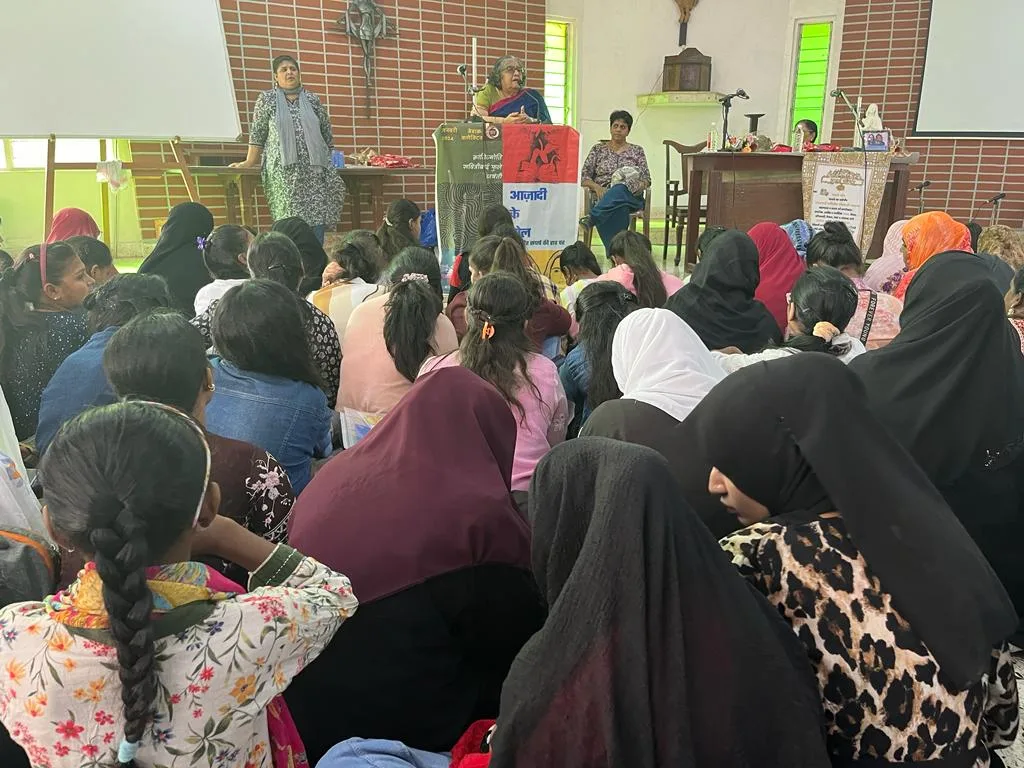
Divya Nizama, a young woman in her early 20s from Vadodara in Gujarat, was in Mumbai to celebrate Savitribai’s legacy. She has travelled here along with dozens of women from Baroda and a couple of activists from the Sahiyar Collective, a gender rights organisation.
“My first visit to Mumbai for the jayanti was a couple of years ago when I had to lie to my boss and my family. This time I told them I am going for a programme. This was such a joyful tour, I spent time by the sea shore with my friends, clicked photos outside ‘Mannat’(Shahrukh Khan’s bungalow in Bandra). I travelled in local trains. I owe this freedom to Savitribai, don’t I?” said Nizama.
The Bandra event drew packed houses with hundreds of young women, mostly Muslim. The celebrations cutting across class, caste and religious divides, upheld the anti-caste, and feminist teachings of the Phules and their comrade, Fatima Sheikh.
The Beginnings of Savitri Utsav
Shahista Khan, 26 came from South Mumbai’s Byculla neighbourhood with dozens of women. For her it is important to further disseminate the teachings of Savitribai. Wandana Sonalkar, a senior feminist thinker and economist, spoke about why the reformer is as relevant today as she was in the 19th century. At another thought provoking panel discussion, gender activists Saba Khan, Bhavya, Smriti, Nisha Parche and Urmila Salunkhe spoke on the rights of the LGBTQI community.
Anti-caste thinkers and teachers, Jyotirao Phule and his partner Savitribai started the first school for girls from all caste groups in 1848 in Pune. This was a revolutionary step at a time when much like today, Indian society was split by caste, class and religion. Savitribai would be attacked every time she went to school, stones and dung flung at her, by dominant caste opponents. She took to carrying a second sari with her to deal with the harassment. Along with Fatima Sheikh, a young Muslim woman from Pune, she began more schools for girls from the state’s shudra and atishudra communities.
This rebelliousness and fierce courage inspires young women from across India, we found.
It was a group of socialist activists with the Rashtra Seva Dal – Sharad Kadam, Sirat Satpute, Subhash Ware – who initiated the idea of ‘Savitri Utsav’ as a bahujan cultural alternative in Maharashtra. They started celebrating Savitribai’s birth anniversary with cultural programmes at the Chabildas High School in Dadar, a popular cultural hub in central Mumbai. Kadam, a retired banker, also started celebrating Savitri Utsav at one of the branches of Apna Sahakari Bank where worked; the tradition continues till date.
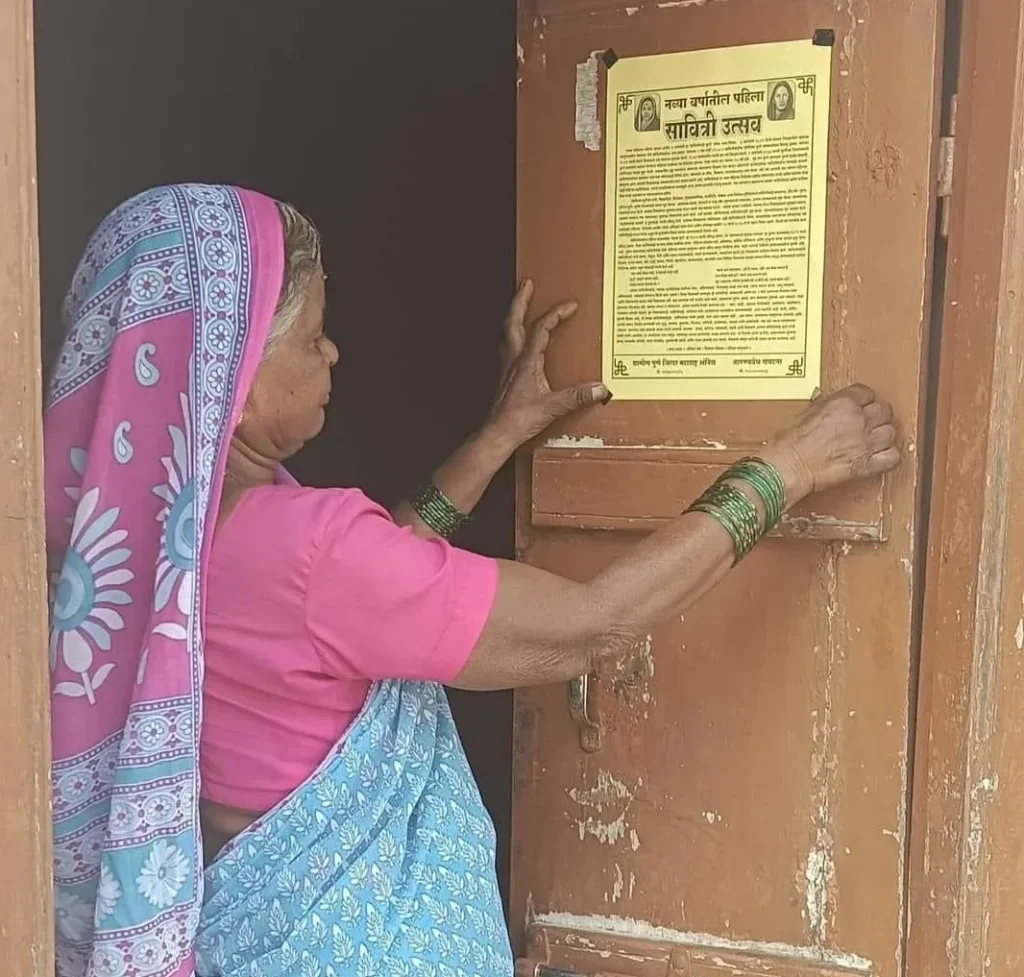
Lessons From A Revolutionary Life
In her lifetime, Savitribai Phule broke a host of taboos: apart from schools for girls, she also campaigned against the victimisation of widows, pushed for widow remarriage, and campaigned against infanticide. She led what is now known as the Barber’s Strike in Pune to protest the forced tonsuring of the heads of Hindu widows. Crucial among her achievements is the creation of spaces of solidarity through institutions of education and her work focussed on the marginalised – abandoned women, orphaned children, workers, peasants, and all those oppressed by caste and patriarchy.
That the Phule legacy is potent across the country becomes apparent at Gurugram’s Shiv Vihar neighbourhood in Haryana. Her birth anniversary has been a rallying point for several young women across Rajasthan, Haryana, Delhi and Punjab who come together here to celebrate their own hard-earned freedoms.
An event has been hosted here every year since 2018. It is collectively organised by the Savitribai Janmotsav Samiti, a collective of students, and industrial workers along with Shiksha Ke Sathi, a body that works with the children of workers. There are plays, songs, dances and films commemorating the life of Savitribai. The participants include young people from as far as Jamshedpur and Ludhiana.
Preparations for the programme began 20 days earlier, with many young people arriving in Gurugram days before the event. “It’s a big celebration for us, and we even fight with our parents to come here. But Savitribai’s own stories give us the courage to come here,” said Muskan, 18, Jaipur’s Jhallana basti.
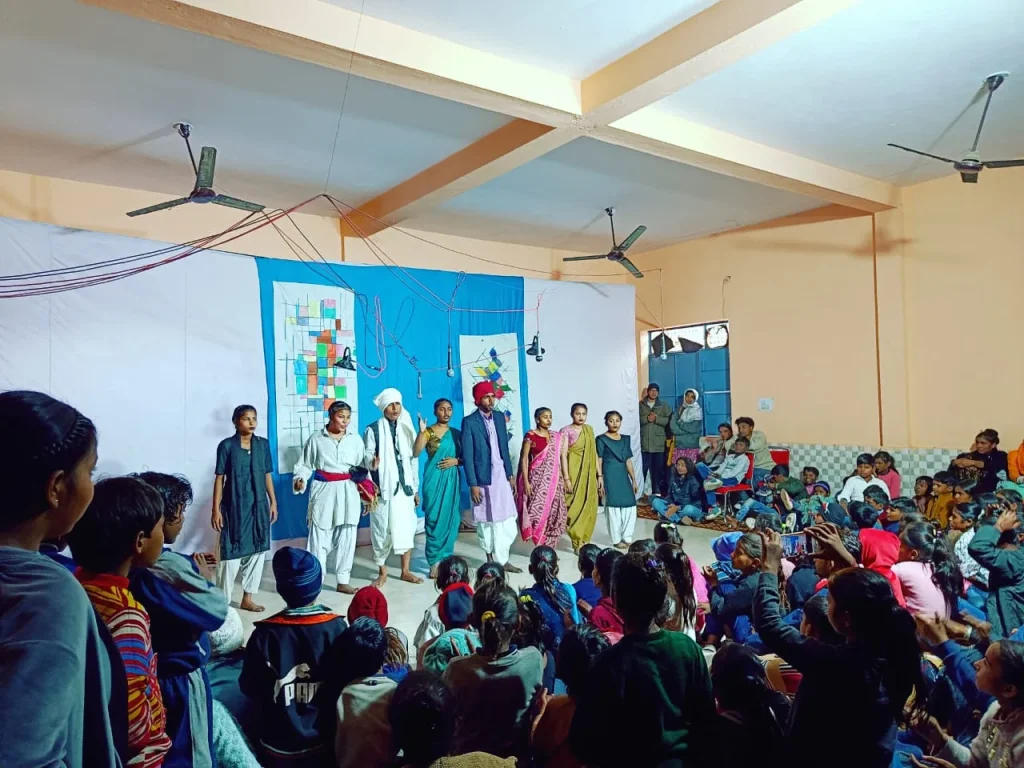
Emulating Savitribai
Muskan, Laxmi (17), and Kajal (16) are sisters who are students at Jaipur’s Someshwarpuri Senior Secondary Government School. All three had to drop out of school when they were 10 when the school demanded their Aadhaar cards as proof of identity which they did not have.
When the three heard of a free library that also taught drop-out kids near their basti, they immediately went there. “We not only learnt how to read English, but also about people like Savitribai Phule, Fatima Sheikh, Ashfaqullah, Bhagat Singh. They inspire us,” said Muskan. The library, called “Apni Library”, is run by a youth organisation, the Krantikari Naujawan Sabha (KNS), based in Gurugram and Jalore, Rajasthan. It works with children of working-class colonies, coaching those who are in school and coaching those who had to drop out.
Inspired by Savitri and Sheikh’s legacy, all three sisters now teach dropouts in their basti. “Hamara man karta hain ki log padhe, aage badhe, isiliye hum khud padhaate hain (we want people to get an education and progress in life)” said Muskan. They had to fight with their families to travel to the celebrations in Gurugram. “Humein ghabrahat bhi hoti hain ki gharwalein kya sochte hain, par phir himmat karke aajate hain (we feel anxious about defying our parents, but find the strength to do what we need to do),” said Muskan.
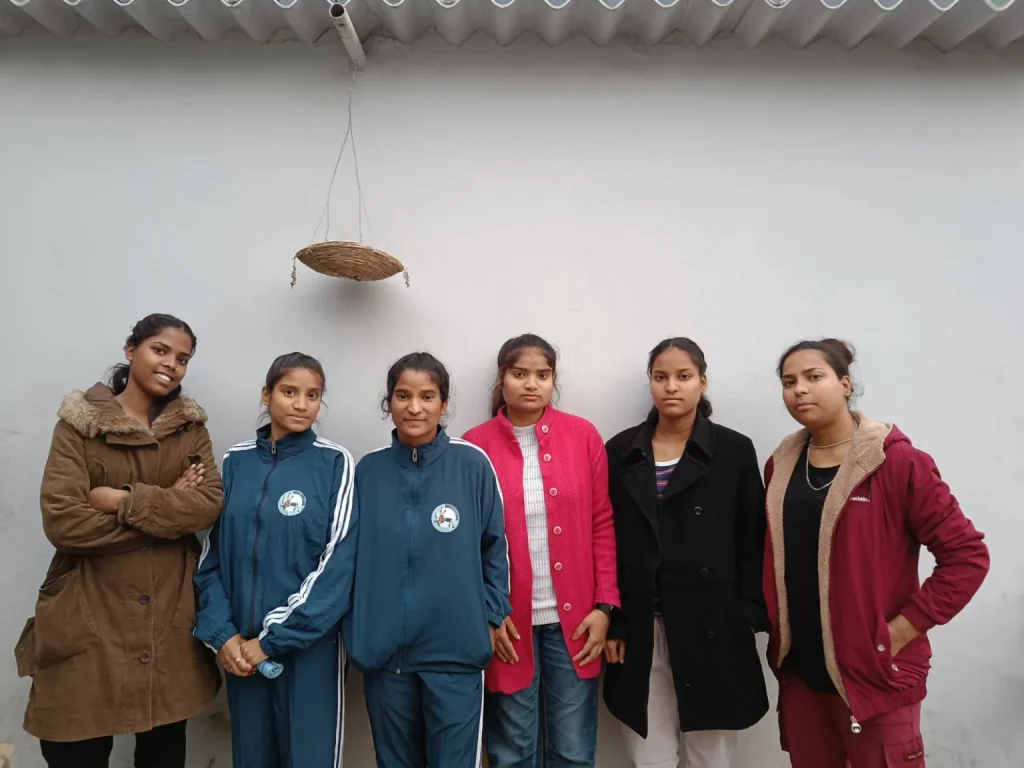
Nizama from Baroda too comes from an economically underprivileged family. She had to drop out of school in Class 12. Savitribai’s struggle inspired her to pursue education again.
She had failed a couple of subjects in Class 12 and had to drop out for three years to help support her family. “Then I started attending computer classes in my basti, held by the Sahiyar Collective. I would listen to the women around me talk of Savitribai’s struggles. I then managed to clear my 12th and now doing my BA while working in a unit that makes imitation jewellery. I am taunted at work when I ask for leave. But that is nothing compared to what Savitribai faced. Only education will uplift us,” said Nizama, who also wants to design feminist merchandise and create a craft hub some day.
Savitribai’s story also inspires Priyanka, 16, from Mankhurd in Mumbai, who was participating in the Bandra event with her friends. “I am in Class 11 in SNDT College. I knew of Savitribai’s history but didn’t realise that it is worth celebrating. Today, I feel that like Babasaheb’s [anniversary], Phule Jayanti too is important – they are our role models,” she said.
‘Chiri’, The Mark Of Rebellion
Hundreds of women’s groups in Maharashtra also celebrated Savitri Jayanti at their workplaces, residential societies, schools, and anganwadis. The practice of wearing a nauwari and drawing a chiri on the occasion has been popularised recently by social media platforms. It’s a gesture of gratitude and a cultural symbol that resonates with hundreds of women.
“Celebrating Savitribai’s Jayanti is an important milestone in the journey of resisting the cultural hegemony of the elite — traditions, symbols that this elite has cultivated over centuries. Sporting the chiri, photographing it and sharing it on social media makes for cultural symbolism. It challenges patriarchal notions about tikali, bindi etc which are associated with matrimony,” said Mukund Kule, independent journalist and researcher of folk literature.
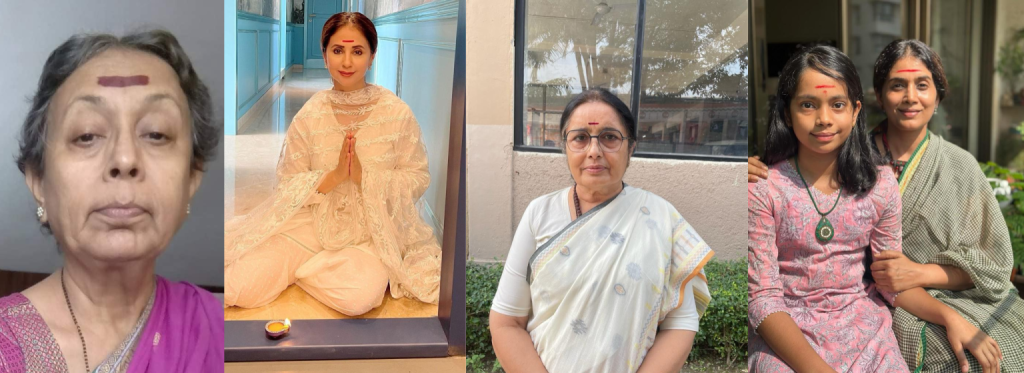
The chiri is worn on the jayanti by women across age and social groups — married, unmarried, widowed. It is their way of saying that they embrace this rebel Savitri, and not the one of Hindu mythology whose penance brought her husband back from the dead and whose fidelity is worshipped as Vat Purnima.
Savitribai in Popular Culture
Sahihri jalsa is a platform where Marathi folk singers, mostly from marginalised communities, perform revolutionary poetry to the accompaniment of the tabla, harmonium and duff. Sheetal Sathe’s jalsa, ‘Azadi ke bol’, for instance, compels audiences to think about an array of issues – the Palestinian crisis, mob lynching, caste violence and patriarchy. At the Bandra celebrations, she sang Sau Muktiche Paul (Savitri leading the steps towards liberation) Vhay mi Savitribai (Yes! I am Savitribai) is a play written, directed and performed by veteran theatre actor and activist Sushama Deshpande. It chronicles the life of Savitribai, and is performed across Maharashtra on the jayanti. Recently lawyer Yogini Khanolkar translated the play in Pawari, the language of the tribals living in Nandurbar, Dhule. A young student Elisa performed the Pawari version in Dhule for the first time this year, on the Savitri Jayanti.
Reports have also come in from Ratnagiri, Mumbai, Sambhaji Nagar(Aurangabad), Thane, Kalyan, Pune, Solapur, Sangli, Kolhapur, Vidarbha and Marathwda of celebrations dedicated to the reformer. ‘Savitri Utsav, a Facebook page managed by socialist activists in Maharashtra, has been compiling images and videos of these events since 2019.
“Celebrating Savitribai’s Jayanti is important to me both personally and socially because I have grown up witnessing gender discrimination around me in Pandharpur [in Solapur district]. I could complete my education and become independent but many women languish in poverty, illiteracy with no avenues for development. We need Savitribai’s legacy for the collective development of those consigned to the extreme margins,” said Laxmi Yadav, a gender rights activist who has been participating in Savitri Jayanti events for two decades.
Yadav pointed to the fact that the Phules built a Balhatyapratibandhak Griha, a shelter where widows could drop their children born outside marriage– this was not uncommon because widows were often subject to sexual violence by the men in their husband’s families. Savitiribai is said to have died of plague while serving those afflicted. “Her whole life journey has become a pathway for me and younger generations,” said Yadav.
Freedoms, Sisterhood and Solidarity
Tribal women of Bhadrajun block of Jalore district near Jodhpur, Rajasthan celebrated Savitri Jayanti this year for the first time. Around 60-70 women daily wagers from SC, ST, nomadic and Rajput families gathered at their workplace and paid respects to Savitribai.

Social activist Pushpa Sagar of the Savitribai Phule Sangathan in Jalore has been associated with Coro India, an organisation that works with marginalised communities, and during her training she became aware of the Savitribai’s legacy. “Last year I celebrated the event in a school; this time we mobilised the women we work with, mostly tribal and Dalit. Most weren’t aware of who she was and I spoke to them about her work,” Sagar told us over the phone.
Laxmi at the Gurugram event said her mother had argued against letting her travel to Gurugram: “She said ‘shaadi karke jaana jahan jana hain, abhi toh hum nahi bhejenge kahi bhi (go wherever you please once you get married, we won’t let you). But the girls are not the least keen on matrimony. “Shaadi ke baad toh aur baandh denge (marriage will further bind us),” said Laxmi.
Learning about anti-caste leaders and revolutionaries has led to deeper friendships between women across communities. Laxmi, who is from a Scheduled Caste family, said social interactions between different castes is strictly forbidden in her village and her family too is particular about this. But this has changed ever since the girls started participating in the work of the Krantikari Naujawan Sabha.
“Library walon ke sath hamari dosti itni pakki hain, hum log ek dusre ka jhootha kha lete hai, kapde exchange kar lete hain (our friendship with the people at the library is so deep that we eat from each other’s plates, exchange clothes),” said Laxmi.
Ritu (name changed), who identifies as lesbian and also came from Jhallana basti to attend the event, said education has helped her come to terms with her identity. “It has also given me a close network of friends who know about me and accept me as I am,” she said.
In these times of communal polarisation too, Savitribai’s life can be an inspiration, says Shaista Khan of Bebaak Collective. “The young Muslim young girls who came to the programme and met people from different castes and faiths, heard the sahirs (poets). This exchange of ideas is very important in our times,” she said.
We believe everyone deserves equal access to accurate news. Support from our readers enables us to keep our journalism open and free for everyone, all over the world.

